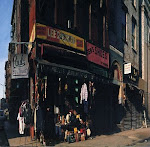
If nothing else, this year’s Olympics will not be boring. The torch relay has been both triumph and disaster in equal measure—but its in answering whose triumph and whose disaster that the question itself gets muddled. So as I write this, Gavin Newsom, perhaps America’s most liberal mayor has organized a security detail that would make a pre-unification East Berlin envious. This must be the first torch relay to have state and federal agencies patrolling the route, with an FBI agent specifically to guard Natalie Coughlin, the five-time Olympic medal swimmer. Visually at least, it will be exactly what it is, a Chinese Olympics: creativity in the midst of a harsh security wall to keep the people out, yet acting as if it’s for the people. Those who fear that the world is being remade in China’s image need look no further than of all places, San Francisco.
I hope the freaks come out in numbers. It’s been a curious time for the Chinese government, stunned and often hit off guard when protesters not only become vocal, but vocal without consequence. If you know nothing about the lives of writers, you may not think anybody is paying for this Olympics with their freedom, but take a look at PEN America’s website and you’ll see the parade of writers who have been detained and imprisoned since this Olympic campaign began in earnest, a crackdown that may not be a literary kristallnact, but is certainly as close to that allusion as one could expect. Many of these writers have not been locked up for any actual writing (yes, some people are still imprisoned for their words) but what they might write. It’s the Philip K. Dick present that the film, Minority Report mistakenly grasped as future. Future murderers may still have it free, but writers have been imprisoned what they might write for centuries now.
That’s because Science fiction has always been about the present. What has also always been with us is the marriage of sports and politics. The repeated calls on both sides of the Chinese political wall to keep politics out of sport smells of both moral hypocrisy and an ignorance of history. There has never been a time when sports have not been political. Anyone who thinks the 1936 Olympics wasn’t a political gesture has no grasp of politics or the Olympics. What about USA’s boycott of 1980? Mexico 68? The USSR’s boycott of 1984? Romania’s decision to ignore the 1984 boycott? Humanitarianism is itself an act of enormous political significance. What’s especially galling about the keep politics out of sport brigade is that they have no problem attaching political significance to an event post Olympics, such as taking some credit for Jesse Owens’ dazzling Olympics run, as if that played some part in the struggle for civil rights. Of far greater significance is that Owens had to race against horses to put food on the table and was charged with tax evasion.
Maybe you can afford to keep politics out of sport but we can’t. Too much is at stake, too many people are watching and too often, people do not change unless the world begins to see. A child abuser is less likely to abuse if nobody leaves him or her alone with child. So far, the Chinese government has tried the usual tactics—hide everybody from view before people start to miss their absence, but that did not work this time. Then there is the potential bloodbath of Tibet, carried about by a government not used to dissent and bewildered by being thrust on an international stage that they cannot control and having to justify their actions— even as they claim that they do not have to justify themselves to anybody. Suddenly, the idea of being true to the sport at the expense of politics has become as ridiculous as it always was, the last retort of politicians and businessmen with a stake in the outcome. By attending the opening and closing ceremonies, Gordon Brown and others are agreeing in public to go along with a sham, admiring the view from the ship’s deck and ignoring the horror of slaves below. They insult us all by remind us that this is ultimately about money and power, not the human spirit or the Olympic Ideal. That is as political an act as any protest.
What does it say about us that we are willing to put human rights on hold just so we can have something to watch on TV for two weeks? What do athletes say by deliberately blinkering themselves, ignoring what they are going into, as if it’s somehow nobler to represent some athletic ideal in a regime dedicated to crushing the human spirit? If you ignore what China is doing in Tibet aren’t you in some way responsible? Some people will support human rights in ‘spirit’ and yet see no moral dilemma in spending money at these games, money that may very well buy better weapons to do a better job on Tibet. When good people do nothing blood is on their hands.
I support these protests, I support free speech, I support Mia Farrow’s campaign and I support embarrassing people into change when nothing else will. You may think humiliating people into change does the opposite, but if you're reading this, chances are you're not the one suffering. You can stay on the sidelines or tell yourself that politics should not be in sports until it becomes a mantra, but if people die while we do nothing it’s partially our fault. I won’t be joining you for beers on your couch, thanks for asking. Because when the oppressors come for me, and one day they might, you’ll be the same person saying sorry man, I just want to watch the game.







-image007.jpg)

